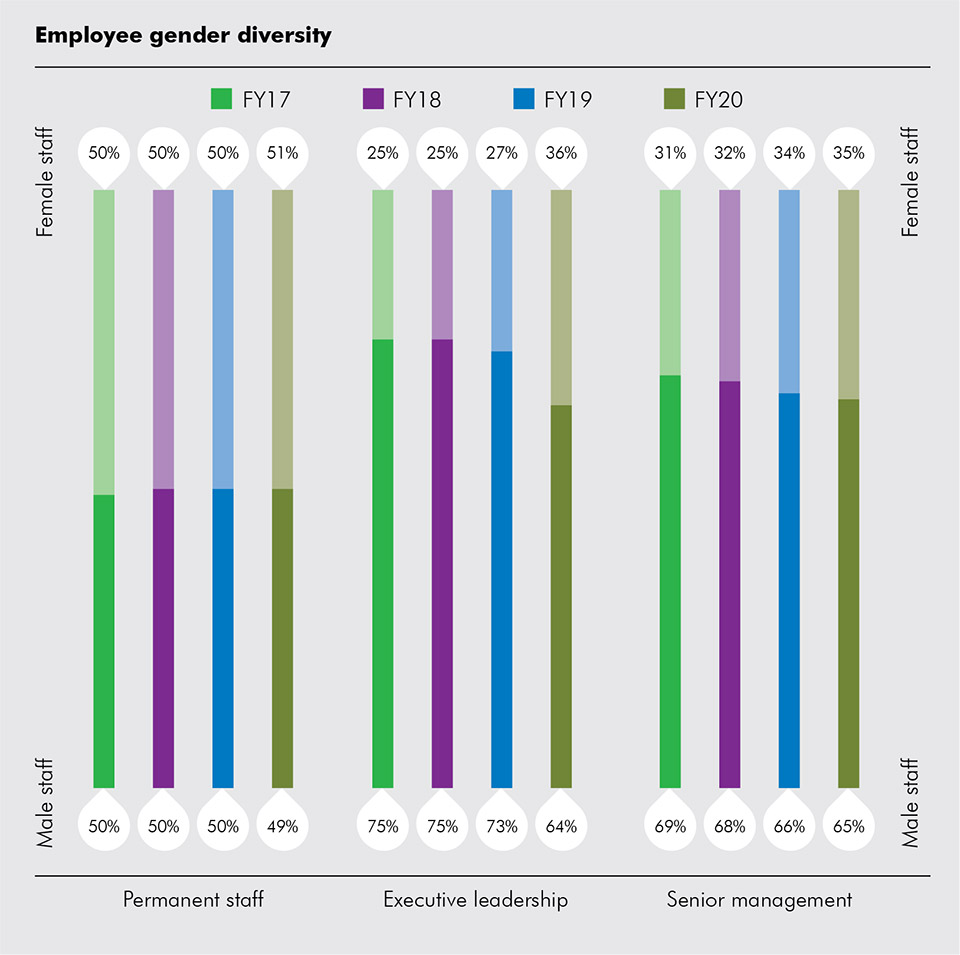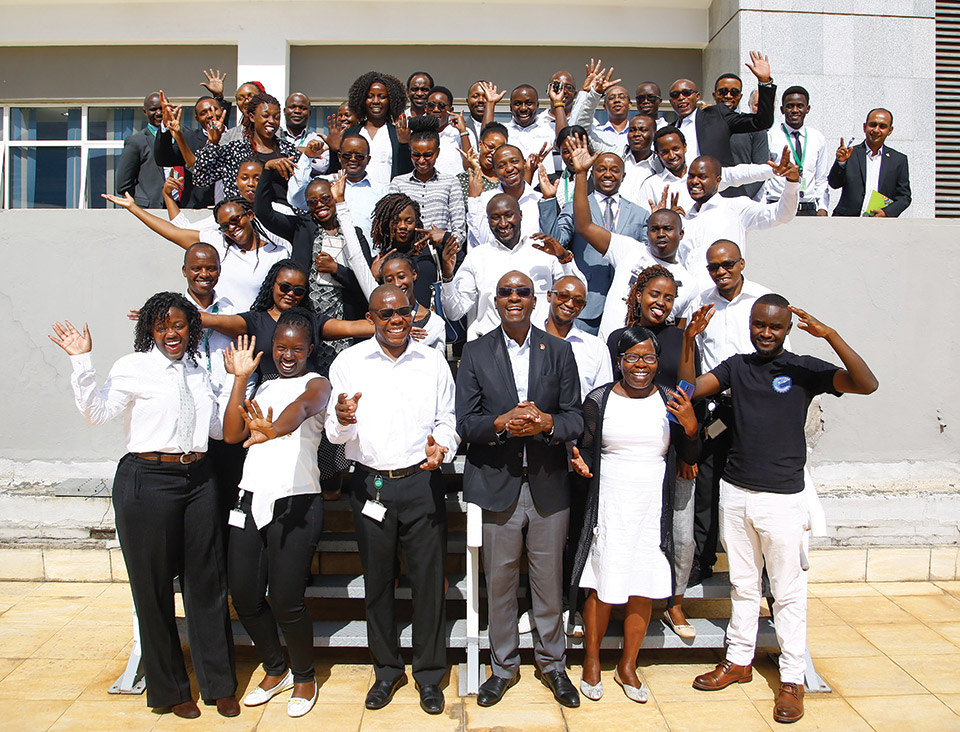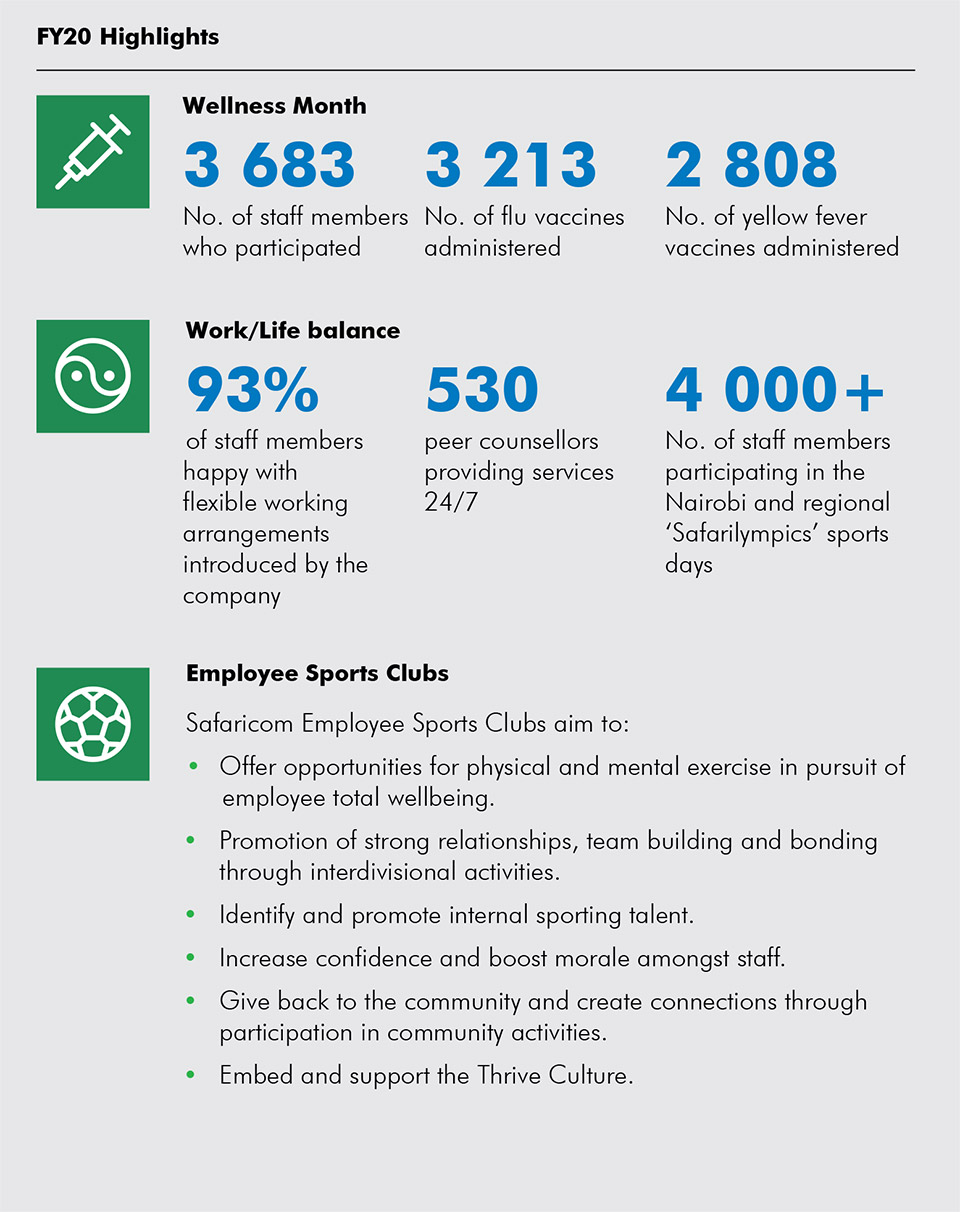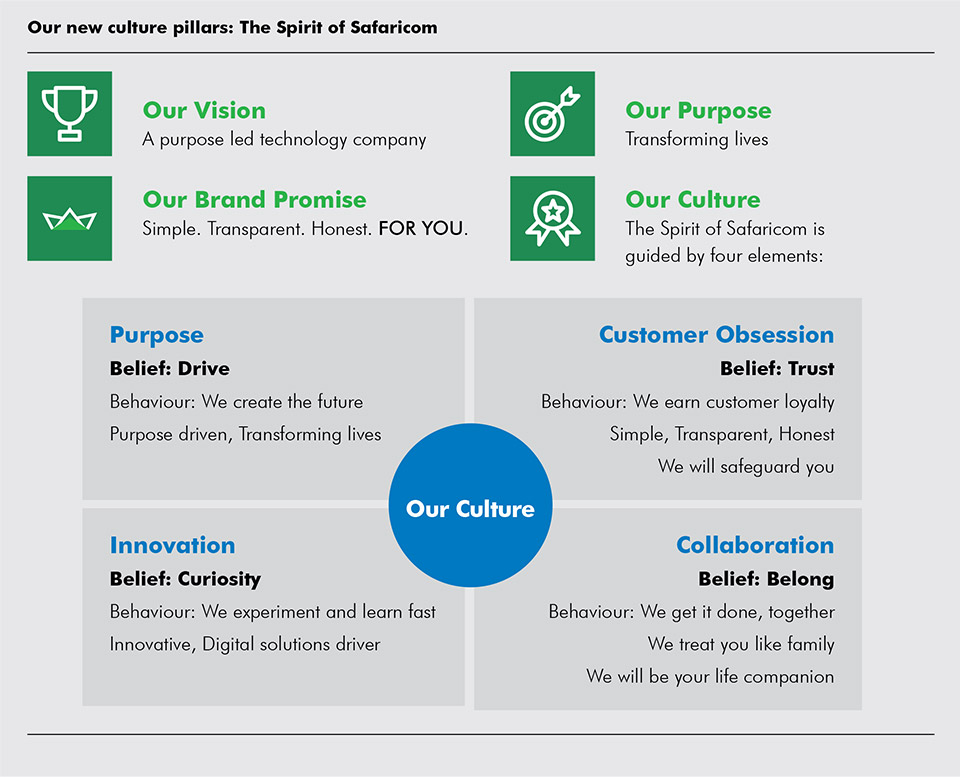Employees
![]() Supporting society through COVID-19
Supporting society through COVID-19
- 70% of staff members have been able to work from home, including 80% of call centre staff.
- Provision of connectivity – zero-rating of calls between staff to enhance collaboration experience and provision of ergonomic seats for staff working from home.
- Provision of PPE for customer-facing members of staff working in our shops.
- Voluntary COVID-19 testing made available to employees and their immediate family members.
- Regular fumigation of office premises, especially those with high levels of customer traffic.
- Regular pulse surveys introduced to monitor the ongoing well-being of our employees.



We are committed to driving good health and well-being within our workforce (SDG 3) and to the training of all staff, providing opportunities for skills development to our employees and the youth of Kenya. We strive to recruit and retain a diverse and inclusive workforce and we have set targets for woman in leadership and persons with disabilities (SDG 8 & 10).
We remain committed to being a world-class employer and take our responsibility to maintain a productive, supportive, and safe working environment seriously. We are committed to ensuring that everyone lives the purpose and spirit of Safaricom – guaranteeing that we obtain the diverse talent and critical skills needed now and in the future, and deliver on our ambition to be the best place to be that ensures personal growth and business performance. While shaping an effective and efficient digital organisation that puts the customer first.
Employee diversity
Workforce demographics

Employees by gender

* Includes executive leadership
We are an equal opportunity employer, actively recruiting diverse staff from different backgrounds to be to be reflective of the communities that we serve. We strive to create an environment in which employees are empowered to thrive, regardless of gender, disability, religion, race, age, thinking style or any other quality.
We are committed to equal gender representation at all levels. Our target is to achieve 50:50 gender parity at senior management level by 2025. At the close of the reporting period, the proportion of women in senior management roles was 35 per cent (an increase of one per cent from FY19) and in our executive leadership it was 36 per cent (an increase of nine per cent from FY19). While we are satisfied that we are moving in the right direction, we acknowledge that there is still much work to be done if we are to achieve our ambitious target by 2025.
Women in Leadership programmes
In terms of achieving gender representation at senior levels, progress has been slower than we would like because this continues to be a multi-dimensional issue and one that affects technology companies like Safaricom disproportionately. The lack of women in senior positions is an issue that starts at tertiary-level educational institutions, which find fewer women applying to study technology-related subjects, and, even earlier, at school. We are addressing this ’external’ aspect of the issue through our Women in Technology (WIT) programmes, which seek to develop a pipeline of female talent in the field of technology (see the WIT summary presented in the Society section on page 63 of this report).
Internally, our Women in Leadership (WIL) programmes, such as the Paa Dada initiative and the Safaricom Mowgli Mentorship programme, work to support and develop female leaders to create a pipeline of potential talent that is ready to assume senior positions within the firm.
Overall, we trained 50 women through our WIL programmes during the year. Through the Safaricom Mowgli Mentorship Programme, specifically, we trained 15 mentors who are currently mentoring 30 mentees on career and personal growth. Six members of the programme were promoted during the year.
Technology Division

Changing skills priorities impacts gender representation
The following table describes the movement of employees during the year by career level and gender. The percentages in the table represent the proportion of the staff population at that career level and gender (not the proportion of the total staff population).
As the table illustrates, the labour movements within the business remained fairly stable. This was largely driven by the measures put in place to achieve gender parity at all levels as well as our employee value proposition aimed at making us the best place to work. As we transition to a becoming a digital services provider, we continue to invest in upskilling our workforce and exposing them to broader roles and assignments.
Our transformation from being a telco’ to being the digital services provider has changed the roles and skills being prioritised within the business. This has impacted our talent management goals and slowed down the recruitment and growth of women within the business. We have had fewer vacancies this year and combined roles into bigger portfolios that are frequently absorbed upwards by a more senior employee, who is often male.
Internal labour market map
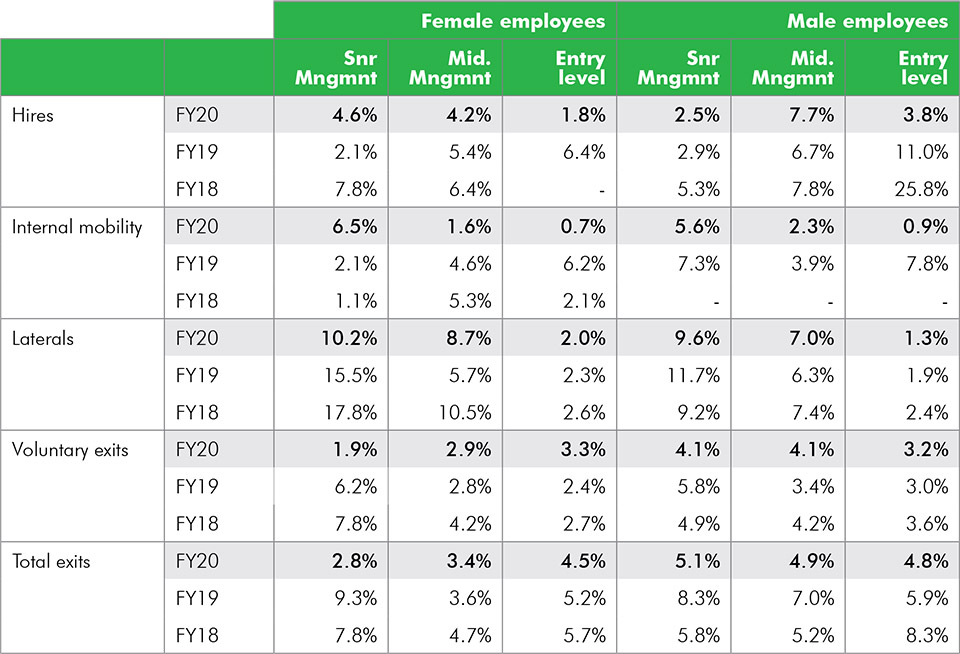
Supporting persons living with disabilities

The UN Flagship Report on Disability and Development 2018: Realizing the SDGs by, for and with persons with disabilities – emphasises that people living with disabilities are at a disadvantage regarding most of the SDGs, but it also highlights the growing number of good practices that can create a more inclusive society in which they can live independently. We aim to recruit more people in this group as permanent staff in the technology division and across the business. We have set an aggressive target that five per cent of our workforce will comprise persons living with disabilities by 2025. Currently, 2.3 per cent of our employees are persons living with disabilities.
Even though we had hoped to have recruited a larger number of persons living with disabilities during the year, we anticipated that progress would be slow. Much like the challenge of gender representation, this is a multi-dimensional challenge that we are unable to solve on our own. Creating a pipeline of persons living with disabilities to recruit starts long before they arrive for an interview at Safaricom.
As a result, we have spent a good deal of time putting the foundational pieces in place. We have been creating relationships with around 40 disability-related organisations so that we can start identifying and supporting potential candidates at earlier stages. We are optimistic that this hard work will start to pay dividends in the near future.
During the year, we continued to raise awareness among organisations and leaders in the private and public sectors. We have become a lead member of the Forum for Global Disability, which meets quarterly to accelerate, track and report progress on the disability agenda in Kenya. We also became the first Kenyan company and fourth African company to join the coveted Valuable 500, a global movement that takes the disability agenda to the boardroom. We have also worked at raising awareness within the company and were gratified to see that 90 per cent of employees believe that we celebrate diversity within our workforce in the latest SEMA Survey. We also won two awards for Diversity & Inclusion from the Federation of Kenyan Employers (FKE) during the year, and the Daima Trust DIAR for being the most inclusive company in Kenya.
Employee engagement
We use the Employee and Manager Engagement Indexes (part of our SEMA Survey) and staff turnover rates to measure the morale of employees. The two indexes measure how employees and managers view the organisation by which they are employed, the level of connection and commitment they feel to the organisation, and how passionate they are about their jobs.
As the following table illustrates, employee engagement decreased by seven per cent to 89 this year. We attribute this decrease to the disruption and uncertainty created by the sudden passing of our late CEO, Bob Collymore, at the start of the year, and the negative impact of the COVID-19 pandemic at the end of the year. A score in the high 80s, nonetheless, suggests that employees have a very positive attitude towards the company and a high level of commitment and satisfaction.
Employee morale

SEMA Survey
Participation in the SEMA Survey improved this year with 4 919 members of staff responding, which equates to 89 per cent of employees (up from 85 per cent in FY19). This level of participation suggests that our people remain confident in this dialogue process. Nine out of 16 categories have improved since 2018, although some of the progress made in FY19 has not been sustained. There is continued effort to engage with employees as we work towards improving our performance going forward. Overall, the scores place the company at par with other high performance companies.
![]() 2020 SEMA survey summary
2020 SEMA survey summary
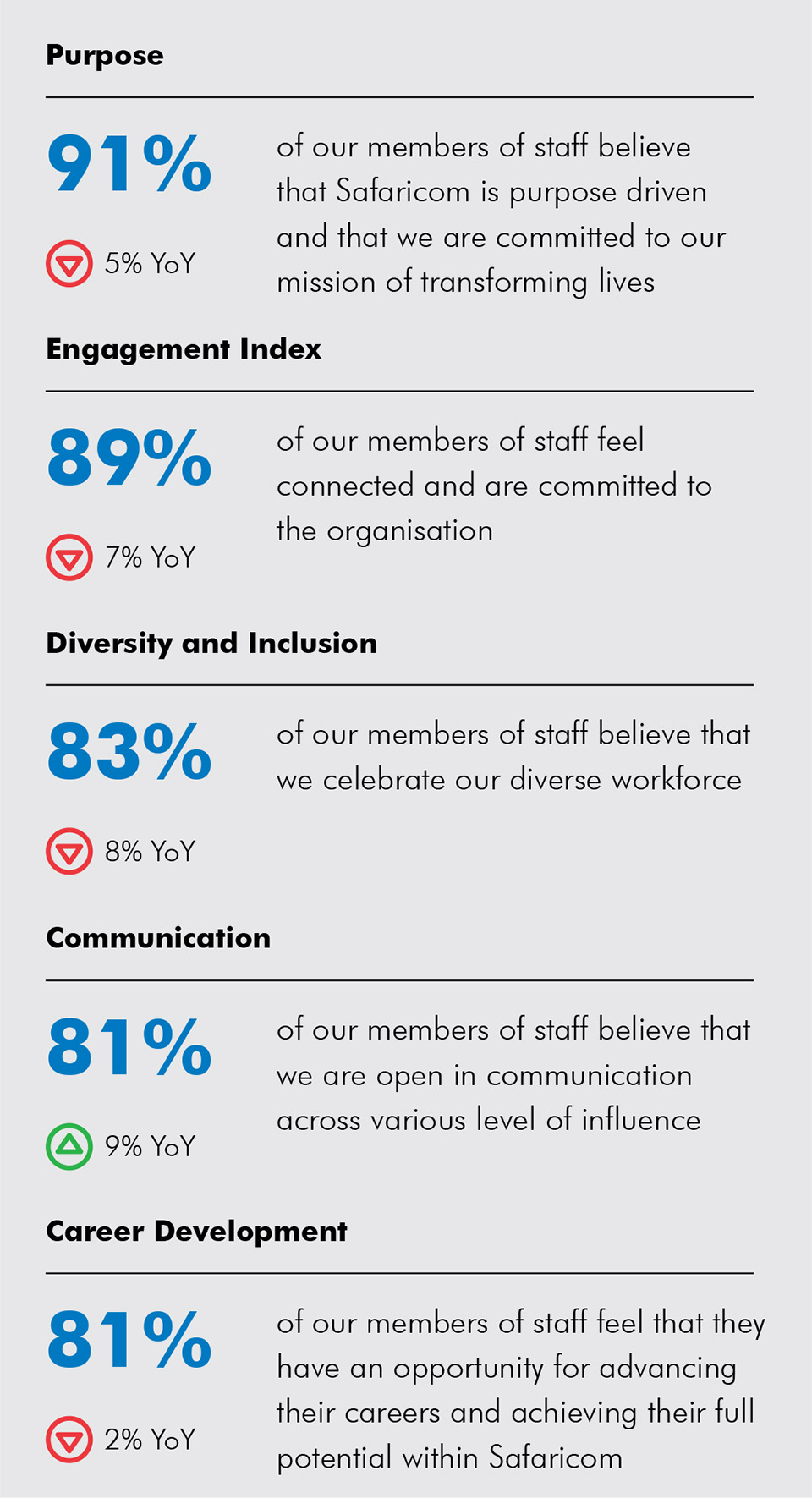
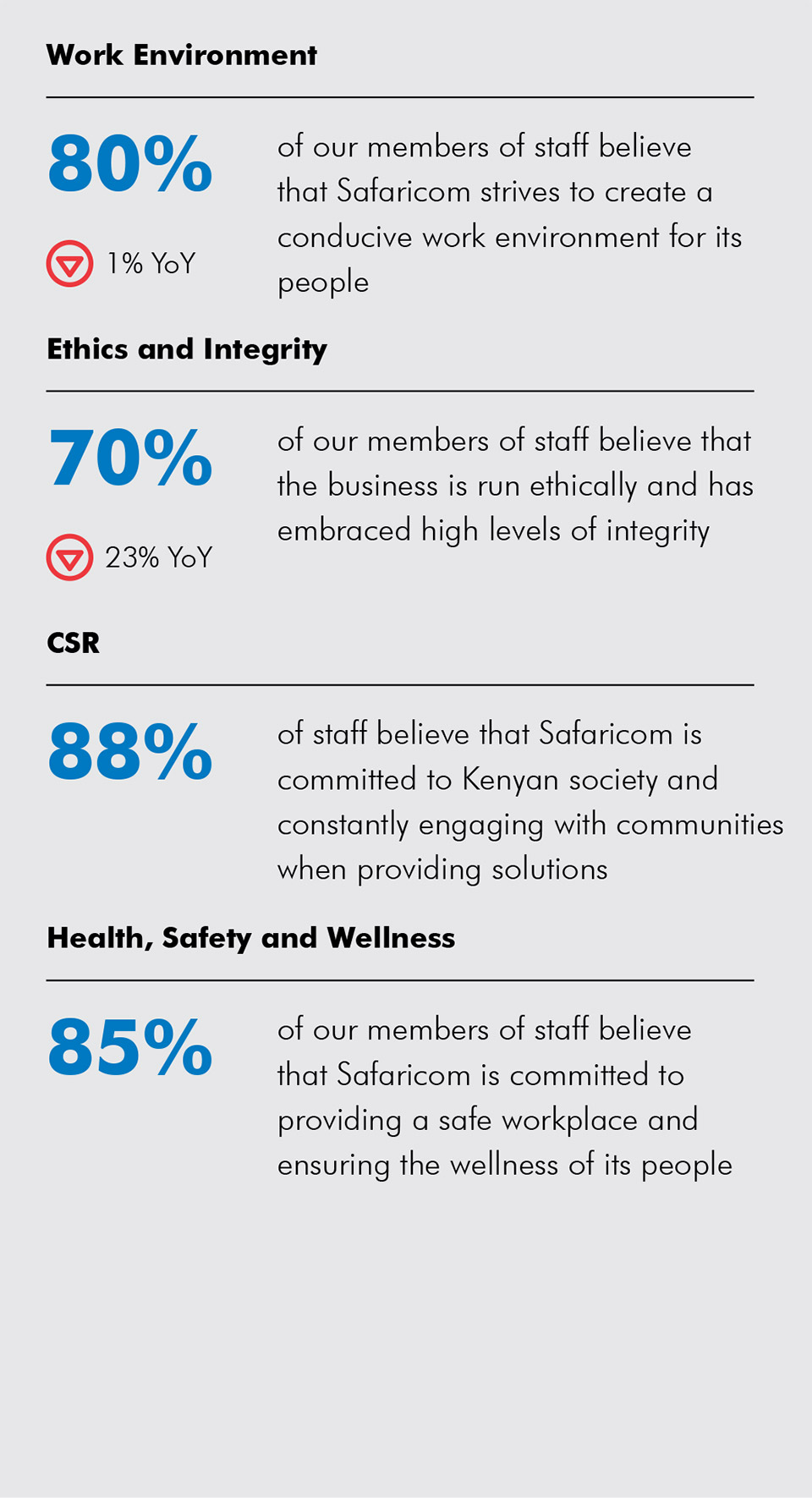
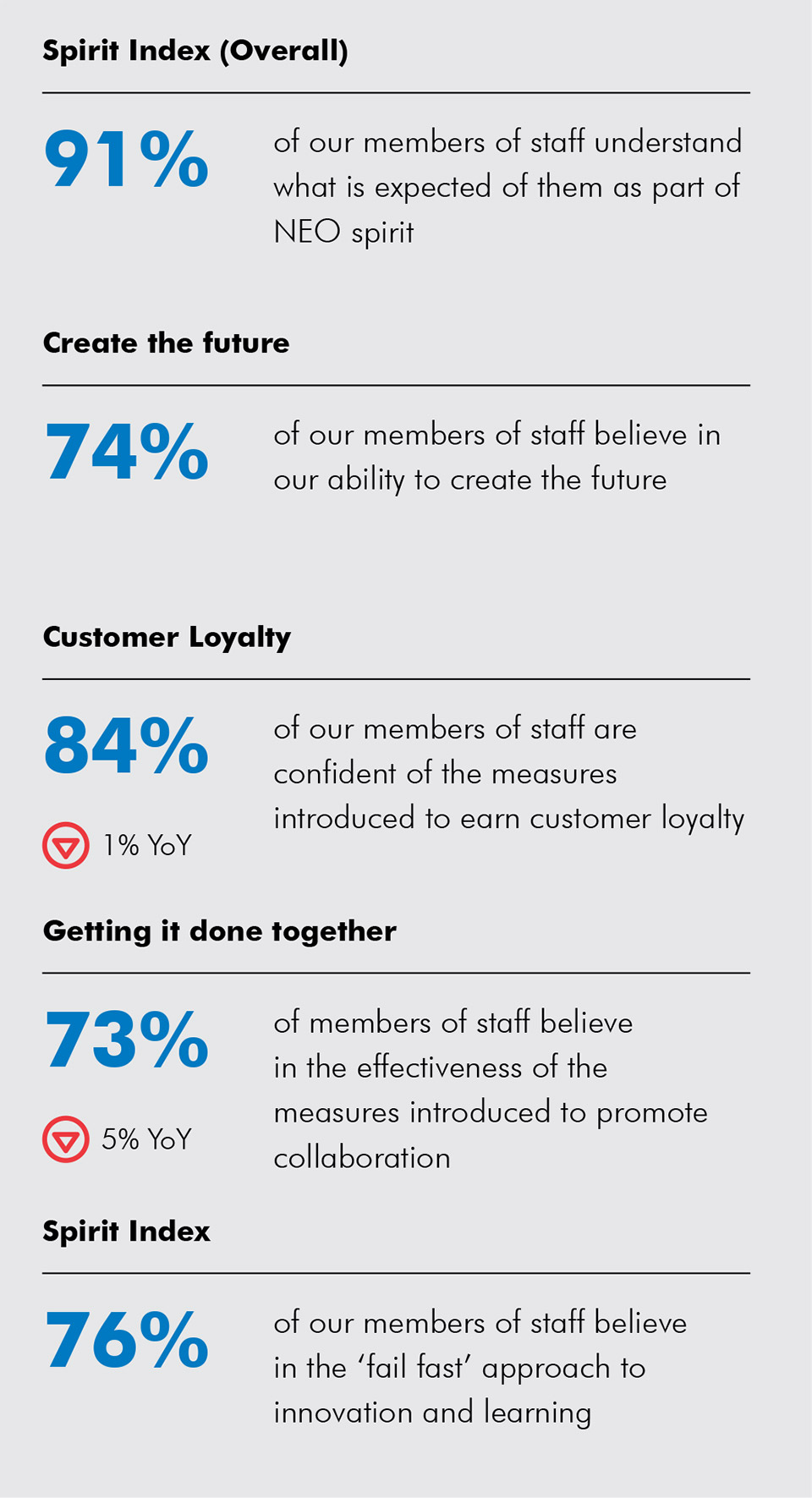
Skills training and career development
The decrease in training spend during the year reflects our intentional transition to e-learning via the Safaricom Business School and Digital Academy. The cost of delivering e-learning is substantially lower than traditional classroom-based learning. The shift has been accelerated by the COVID-19 pandemic and we anticipate that e-learning will account for at least 10 per cent of our budget going forward. Likewise, the percentage of employees that attended training was expected to decrease as we cut back on classroombased learning and shifted perceptions from seeing training as something that we undertake ‘away from our desks’ to part of our daily job.
Training

Safaricom Business School
As part of our transition to e-learning, we launched the Safaricom Business School in October 2019. The robust learning platform hosts over 10 000 digital courses from five different vendors. During the year, 85 per cent of distributed licences were activated, with 68 per cent of courses completed and an average of 15 learning hours per employee delivered. The learners who achieved the most training hours, received recognition from their line managers. In FY21, we aim to achieve a licence activation of 90 per cent, and an average of 40 learning hours per employee delivered.
Building a resilient workforce through Safaricom Digital Academy
The Digital Academy enables employees to reskill and learn the digital skills we have prioritised as part of our transformation to being the digital services provider of choice. We increased the number of employees participating in the Academy from 60 in FY19 to 100 this year, and plan to expand this to 500 employees in FY21. Twenty-three per cent of the employees in the current cohort are from our commercial and support teams. All 60 employees from the FY19 cohort have transitioned to digital roles within the company to encourage the application of the skills learnt and career growth.
Discover graduate management programme
Our Discover programme is a graduate management trainee programme that enables greater talent mobility within the business and supports our drive to make Safaricom increasingly global by accelerating the development of our talent pool. The 18-month programme incorporates rotations within and across functions in an accelerated learning environment to build depth and breadth of experience, and is designed to prepare future leaders to assume challenging responsibilities and roles. The professional development and growth of trainees in terms of becoming functional experts in different areas, such as cyber security and data science, is measured throughout the programme. Each year we hire 20 graduates, split 50:50 by gender. We currently have 73 Discover trainees.
A safe and secure working environment
Total OSH-related incidents
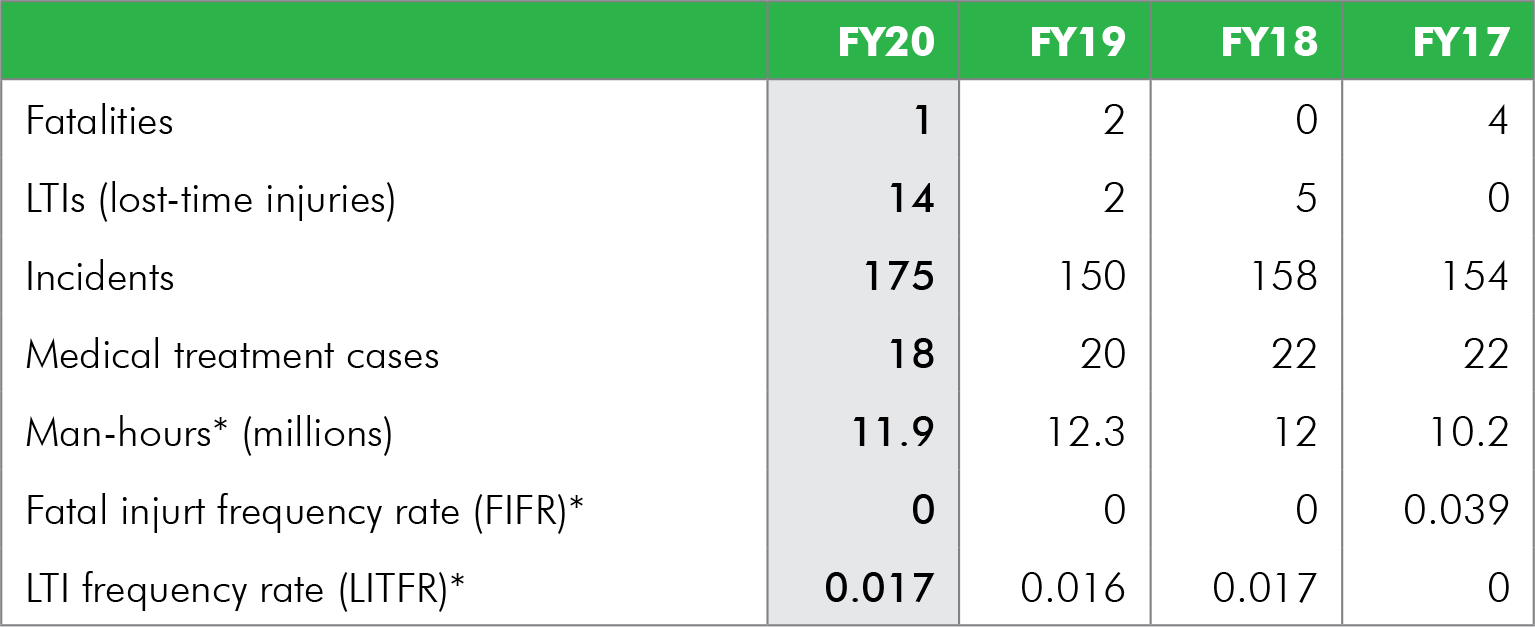
* Employee-related
We continue to take our responsibility to maintain a safe working environment for staff and contractors very seriously. Regrettably, one fatality was recorded during the year. There was a traffic accident that resulted in the death of a pedestrian (third party). Road safety remains an area of focus and we continued with our road safety awareness campaigns, three card penalty system and “Tea with the CHRO” initiative for journey management offenders. Four hundred and fifty eight fleet vehicles are currently fitted with telematics.
During the year, we also continued to work with our contractors to ensure they understand, and comply, with our health and safety standards. We used our quarterly engagements with suppliers and the annual supplier conference to address these issues and have offered further training and support. We also focused on the safety of casual workers carrying out trenching work and reclassified this activity as high-risk.
![]() Looking ahead
Looking ahead
- We plan to become a zero fatality organisation through a ‘100 per cent home safe’ approach, with four strategic executional priorities, anchored on a risk-based approach and leveraging on the enablers of leadership, behaviour and culture. We will build a positive safety culture through visible safety leadership, the embedding of Health, Safety and Wellness objectives in individual performance objectives, and by rewarding and recognising positive safety behaviour.
- We will implement a digital tool to enable contractor oversight and enhance engagement on health and safety.
- We will continue to support our staff work safely from home during COVID-19.
- We have developed a new business and organisational culture called The Spirit of Safaricom.

